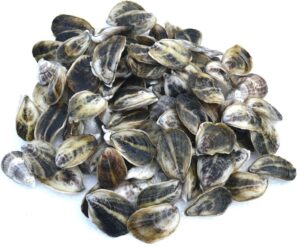Breeding
 Rutgers University has been breeding eastern oysters since 1960 soon after the outbreaks of MSX disease caused by the protist Haplosporidium nelsoni. The breeding program was established by the late Dr. Harold Haskin and has been under the direction of Dr. Ximing Guo since 1998. Rutgers oyster strains have shown strong resistance to MSX and moderate resistance to Dermo, a disease caused by protist Perkinsus marinus. In 1994, Rutgers scientists, Drs. Ximing Guo and Stan Allen, developed tetraploid oysters (with 4 sets of chromosomes) and a new type of triploid oysters (with 3 sets of chromosomes) by crossing diploid and tetraploid oysters. Because of their sterility, superior growth, and improved summer meat quality, triploid oysters have become an important part of the oyster aquaculture industry worldwide.
Rutgers University has been breeding eastern oysters since 1960 soon after the outbreaks of MSX disease caused by the protist Haplosporidium nelsoni. The breeding program was established by the late Dr. Harold Haskin and has been under the direction of Dr. Ximing Guo since 1998. Rutgers oyster strains have shown strong resistance to MSX and moderate resistance to Dermo, a disease caused by protist Perkinsus marinus. In 1994, Rutgers scientists, Drs. Ximing Guo and Stan Allen, developed tetraploid oysters (with 4 sets of chromosomes) and a new type of triploid oysters (with 3 sets of chromosomes) by crossing diploid and tetraploid oysters. Because of their sterility, superior growth, and improved summer meat quality, triploid oysters have become an important part of the oyster aquaculture industry worldwide.
Rutgers Oyster Breeding Program targets four traits of aquaculture importance: disease resistance, growth, shell shape and general hardiness. For each generation, the largest oysters with nice shell shape that survived three years of exposure to MSX, Dermo and harsh intertidal conditions are selected to produce the next generation. Genetic diversity, which is critical for oyster breeding and performance, is maintained through progressive rotational crossing of multiple lines and by controlled introduction of new genetic material. Two disease-resistant strains have been released to the oyster industry: 1) Haskin NEH® strain, which is derived from Long Island Sound populations and shows improved growth and survival throughout the Northeastern region; and 2) Haskin DBX strain that is derived from Delaware Bay populations and shows improved disease resistance and tolerance for medium and low salinity environments of lower Delaware Bay.
Disease-resistant oyster seed for the two strains are available in both diploid and triploid forms through the New Jersey Aquaculture Innovation Center and licensed hatcheries. Diploid and tetraploid broodstock from the two strains are available to commercial hatcheries for seed production. Additional information about the Rutgers oyster breeding program and Rutgers oysters can be found here.